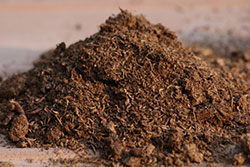Soil improvement is a continual process. It often takes ten or more years to build a productive garden soil. If a soil has too much sand or too much clay, the solution to both is the same — add organic material.
Organic materials, also known as organic amendments, break apart tight clays and hold water and nutrients in loose sands. Organic materials include compost, peat and manure.
How do I amend my soil?

To amend soil, add a two-inch layer of organic material over the surface of the soil. Use four cubic yards of organic material per 1,000 square feet. Mix the material in thoroughly with a tiller or spade to a depth of four to six inches. When growing vegetables and annual flowers, there is an opportunity to add amendments every year. With perennial plants like trees, there is only a one time chance at planting.
What materials should I use?
The best organic amendments are coarse materials. Fibrous sphagnum peats are good, but more expensive than compost or manure. Don’t use dusty, fine peats that clog soil drainage.
Native Colorado mountain peat is generally inferior as a soil amendment, and its harvest destroys mountain wetlands and stream systems. The best peats come from the northern states and Canada.
Is manure beneficial?
Manures should be aged for at least one year and composted if being used on fruits and vegetables. Fresh manure is too high in ammonia and burns plant roots. Avoid feedlot manures which are typically high in salts. Dairy cattle manure is generally a better quality, but poultry manures can also be used. Horse or sheep manures may carry weed seeds, spreading their growth.
Compost is perhaps the best organic amendment. It can be purchased or made at home by recycling yard prunings and clippings. Compost promotes microbiological activity in soils necessary for plant growth.
For more information, see the following Planttalk Colorado™ video(s).
For more information, see the following Colorado State University Extension fact sheet(s).
- Vegetable garden: Soil Management and Fertilization
- Organic Fertilizers
- Choosing a Soil Amendment
- Composting Yard Waste
- Xeriscaping: Creative Landscaping


